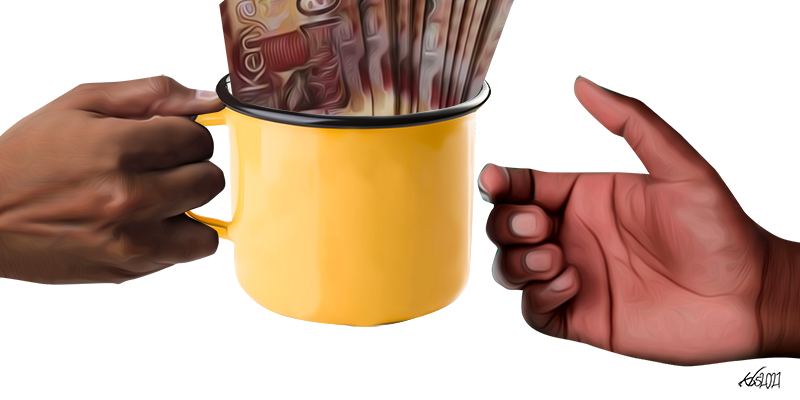Youngsters loiter at their ‘base’. The base, an assembly point in a poor neighbourhood, is the place to play a game of cards, smoke bhangi (marijuana), plan criminal activities or preach the ideology of extremism. Drunken chatter from the bar nearby and rap music from the CD vendor fight for dominance. The stench of gasoline from a garage cannot compete with the smell of bhangi. It is here that young people get radicalised and express their disgust of the ‘stinking rich.’
‘We’re trapped here,’ says one boy as he lets bhangi smoke escape from his mouth, ‘My base is the centre of my world. And beyond I see rich neighbourhoods built with stolen money. On television I watch corrupt politicians. It’s my neighbourhood against yours. You’re rich because I am poor.’
The boy will not talk about the recruitment that is taking place in slum areas under the Somali terror group Al-Shabaab, the reason why I came to report in this area. ‘We have learned that we do not need to fight in Somalia’, says his friend. ‘There are plenty of reasons to fight in Kenya.’
The gap between rich and poor is enormous is Kenya. That is not just because of their different income, but primarily because of their different outlook on the country. From the perspective of the poor inhabitants – the majority – Kenya’s elite is rich thanks to massive corruption. Large-scale corruption does not only suffocate an economy, it kills any feeling of brotherhood and nationhood. ‘I am therefore declaring with immediate effect corruption as a national security threat’, declared President Uhuru Kenyatta in 2015.
In an interview I conducted a few years with Dr. Willy Mutunga, the former Chief Justice of Kenya, he said: ‘We have become a bandit economy. Africa has become stuck after 50 years of independence, after looting of resources. Inequality is also stuck.’ Putting the blame on the corrupt political elite, Mutunga added, ‘If our constitution and the clause Chapter 6 about corruption were being implemented, I am sure 80% of [politicians] would not be suitable for political leadership.’
Mutunga is averse to the pomp, wealth and self-regard that is the hallmark of many Kenyan politicians. He has been nicknamed, ‘the Robin Hood of the Kenyan judiciary.’ Mutunga claims corruption in Kenya has never been worse than today. ‘The influence of the cartels is overwhelming,’ he said. ‘They are doing illegal business with politicians. If we do not fight the cartels, we become their slaves. But leaders who do take on the cartels must be prepared to be killed or exiled.’
Mutunga’s opinion is similar to the view from the “hood”. The perception that Kenya is more corrupt than ever seems to be vindicated in reading Kenyan newspapers. One of the more sensational stories focused on a judge called Philip Tunoi. It was reported to Mutunga’s office that the judge from the Supreme Court took a two million dollar bribe to sway the opinion in an election petition in favour of Evans Kidero, the former governor of Nairobi. The shock was the amount; Kenya is not (yet) Nigeria and high amounts like this are not common in bribing officials.
An even more intriguing newspaper story was about former minister Anne Waiguru, under whose watch 8 million dollars reportedly vanished in her ministry. No minister accused of abuse of office has ever been taken to court and then prison in Kenya’s history. The first big opportunity to show that the rule of law is paramount occurred in 1966. Journalists at the Daily Nation had uncovered evidence that minister Paul Ngei had stolen money from the Maize Marketing Board. Ngei’s political opponent, the equally powerful minister Charles Njonjo, called the editor of the newspaper and consequently gave permission to publish the story.
But the revelation regarding Ngei presented the then president Jomo Kenyatta with a dilemma. A strong bond existed between the two dating back to the anti-colonial struggle. More importantly, Kenyatta could not do without the support of Ngeis Kamba tribe. So the minister went free. The government proposed an inquiry, a usual trick in the cover-up culture. Since then a secret code has applied in Kenya: powerful politicians are above the law, no matter what newspapers reveal about them. Yet it was in Jomo Kenyatta’s time that a mania of predatory profiteering, a system of corruption and patronage, took hold.
The case of Anne Waiguru makes it an even more interesting reading because she was rumored to have had an affair with Uhuru Kenyatta, a rumor denied by the president. But why is she so well protected? Kenyans speculate. She seemed to have everybody in the state apparatus on her side. She was quickly cleared by the official Anti-Corruption Commission. Until a businesswoman involved in the scandal signed an affidavit claiming that Waiguru not only shared in the loot but also played a role in the cover-up. That raised many disturbing questions about the Anti-Corruption Commission.
Waiguru hit back saying that the businesswoman ‘was only … a front for a broader, more powerful cartel with various beneficiaries from the political establishment and the bureaucracy.’ Waiguru pointed fingers at a group around deputy president William Ruto, laying bare the mistrust within the ruling coalition of Kenyatta and Ruto, painting a picture of a political marriage marked by vicious infighting over lucrative procurement tender deals.
That brings to mind what Mutunga told me. ‘As long the cartels are protected, you cannot achieve anything. You are taking these people into a corrupt investigating system, through a corrupt anti-corruption system, and a corrupt judiciary.’ Mutunga’s challenge is a historic fight indeed.
–
This post is from a partnership between Africa Is a Country and The Elephant. We will be publishing a series of posts from their site once a week.








